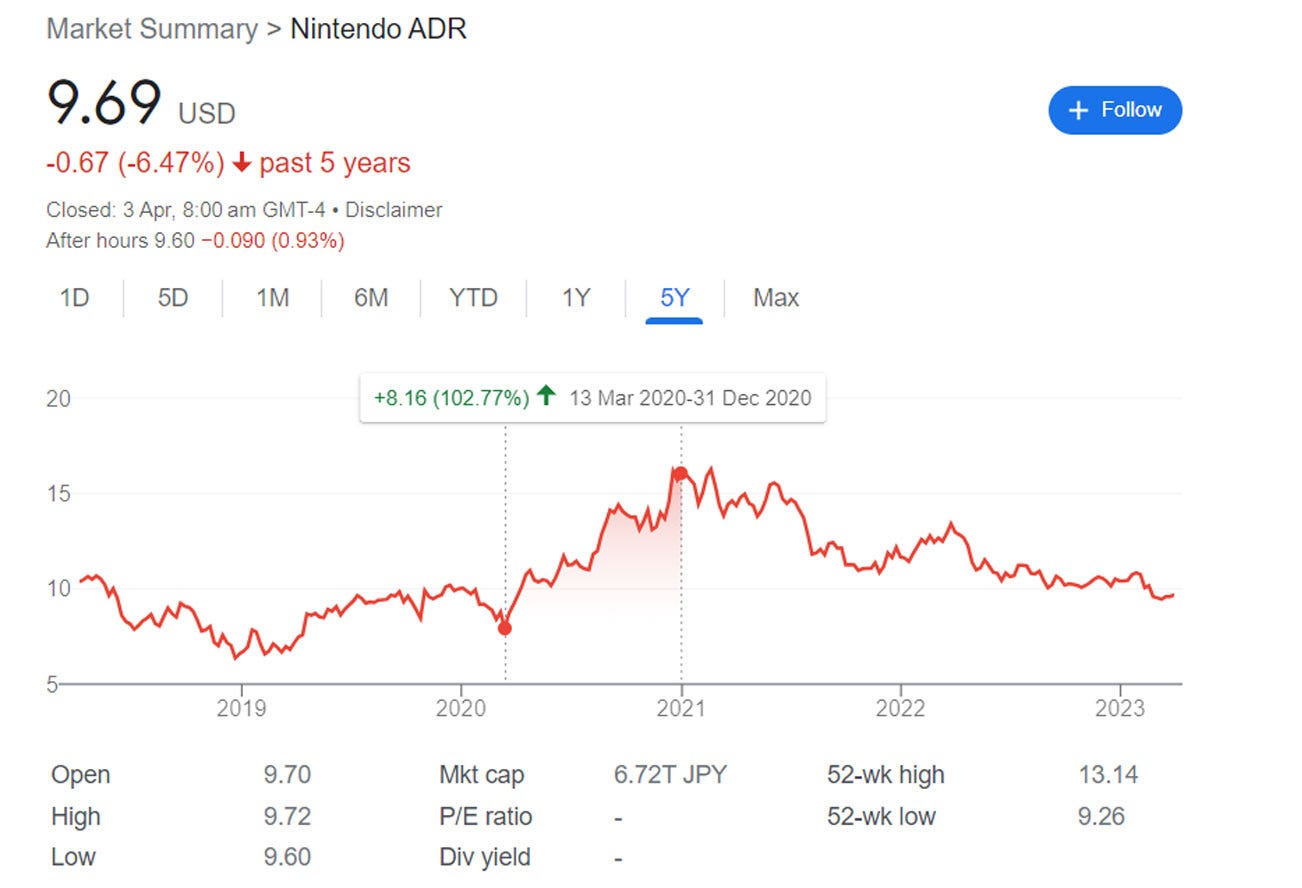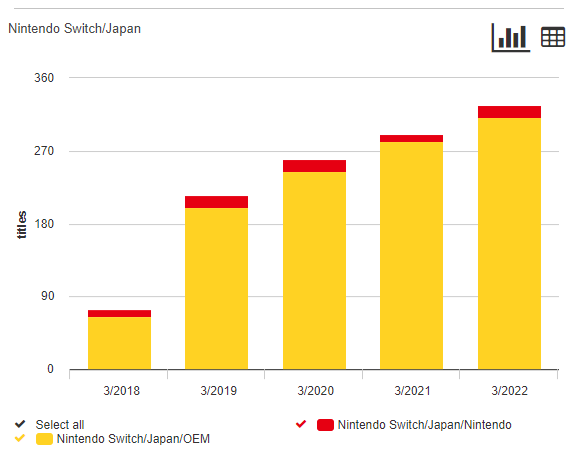Nintendo: a highly undervalued gamemaker challenging Microsoft and Sony
While we know and love Mario, Nintendo has been in the shadows since its golden years of the Gameboy. It had been struggling with a series of consoles that didn’t manage to impress - like that weird WiiU console era, anyone remember that?
But don't sleep on them, because Nintendo's been killing it lately!
If you haven't heard of Animal Crossing, then you've been living under a rock. That game blew up during the pandemic and kept us all entertained for hours on end!
And Nintendo's been on a roll with other awesome games like Zelda and Pokemon. Investors are feeling it too, with Nintendo's share price skyrocketing over 100% from 2020 to the highs in 2021:
Nintendo's management isn't just sitting back and basking in their recent successes - oh no, they're pushing forward! The company's switched up their game with a membership model and is branching out into movies and theme parks to expand their brand.
Now, the big question is: can this underrated gamemaker compete with the big boys like Sony and Microsoft? Let's dive in and find out!
Nintendo Switch: the console that switch up Nintendo’s fate
Nintendo's roots go way back to 1889, when they started out making handmade playing cards in Japan. Fast forward to the 1960s, they made the switch to video games, releasing their first console in 1977. And the rest is history.
You might remember Nintendo for their iconic Gameboy and flip-phone like DS consoles, but they've pretty much struggled since that golden era. As they struggled to capture market share with newer consoles, both console and game sales suffered. Ouch.
But Nintendo finally bounced back with their Nintendo Switch console in 2017! This bad boy lets you play your favorite games on the big screen at home, or take them on the go - talk about innovation!
And let's not forget the pandemic - casual games like Animal Crossing and Mario Kart kept us all entertained and brought even more attention to the Nintendo Switch. Sales have been steadily growing since 2020, and it's clear that Nintendo's still got it after all!
Despite a dip in console sales post-covid, game sales for Nintendo have remained steady. As of February 2023, the Nintendo Switch console has sold a whopping 122.55 million units!
Investors can breathe a sigh of relief as Switch sales have even surpassed that of the iconic Game Boy, and is on track to possibly outperform the Nintendo DS.
How does Nintendo make money?
The success of the Nintendo Switch is especially remarkable when you consider that the previous consoles - WiiU, Wii, and 3DS - didn't perform as well.
Nintendo's original business model centered around creating and selling a flagship console and games. This approach had a downside: if the main console didn't sell well, it would hurt the sales of all their games too.
But Nintendo's latest moves are finally allowing it to break free from that model. And it's starting to pay off big time!
Today, in addition to console and game sales, Nintendo unlocks additional revenue from several sources. One of them is the Unfold system: downloadable content (DLCs) that allow users to pay for additional content after they've purchased the original game. These DLCs are natural upsells that increase the income made per game.
Another revenue stream is the Nintendo Switch Online membership. This membership allows users to participate in online play, gain access to a database of retro games from Nintendo's library, and other bonuses. This allows Nintendo to build a recurring income from its existing pool of users, increasing its revenue over time.
As of September 2022, there are about 36 million subscribers to Nintendo's Online membership:
Nintendo’s Moat
Although often overlooked, Nintendo has developed moats that gives its a competitive edge against Microsoft and Sony:
Sailing into its Blue Ocean by closing the doors on a key audience group
Nintendo's strategy of targeting the blue ocean and appealing to non-gamers has paid off. Instead of competing with Microsoft and Sony head on with high end hardware and graphics, Nintendo focused on delivering innovative and fun gaming experiences that can be enjoyed by everyone.
“We are not competing against Sony or Microsoft, we are battling the indifference of people who have no interest in video games.”
Nintendo's President Satoru Iwata
Nintendo’s games, such as Super Mario, Kirby, and Animal Crossing, feature lovable and cute characters that appeal to both children and adults alike. Nintendo's approach has allowed them to create a unique niche in the gaming market and reach a wider audience, resulting in steady sales.
By embracing their unique strengths and catering to a different market segment, Nintendo has managed to thrive and carve out a successful business model in the gaming industry.
Delivering innovative experiences without cutting edge technology
Nintendo's consoles are like a treasure trove of surprises! They might not have the latest and greatest technology, but they make up for it by offering completely unique and fun experiences.
Instead of the usual remote control and screen pairing, every iteration of Nintendo’s consoles seem to have offered new and unique playing experiences. There are no other competitors offering similar experiences.
DS offered dual screens,
Wii offered motion control,
3DS offered the ability to display stereoscopic 3D effects without the use of 3D glasses or additional accessories and the concept of StreetPass where users can meet fellow 3DS users through the console, and finally,
Nintendo Switch which gives users the choice to play on a big screen or on the move, using the same console.
This means that while Nintendo focuses on the casual gaming market, its innovative consoles give the hardcore gamers an excuse to own a second gaming device for its unique set of games.
Building a strong IP catalog
While Nintendo works with third party developers just like Microsoft and Sony does, they also actively develop their own game franchises:
While Nintendo’s titles make up less than 5% of the game titles available on the platform, the top selling games are usually Nintendo’s own game franchises.
Like Pareto’s principle, the <5% first party titles generate about 80% of video game sales:
These game franchises tend to be exclusive to Nintendo’s consoles, giving the hardcore gamers yet another reason to buy a Nintendo console.
Nintendo’s future?
On top of its game sales, Nintendo has announced various ways to broaden its reach and introduce its catalog of characters to a wider audience.
While these promotions won't bring in big bucks right away, Nintendo is hoping they'll help more people get to know their characters and games. That could mean more customers in the future! Of course, it might take a while to see the results.
But, hey, the fact that Animal Crossing became so popular during the pandemic and boosted Nintendo Switch sales is definitely a good sign!
On top of expanding its reach, Nintendo is also working on:
Nintendo Switch Online Membership
Nintendo aims to beef up their membership offering to hook more peeps and bring in a sweet, sweet stream of recurring revenue. If they play their cards right, this move could be a major game changer for the company.
Exploring new mediums
They've teamed up with Universal to create the Super Nintendo World theme park, which has already launched in Osaka and Hollywood, with Singapore set to launch in 2025!
But that's not all, they're also taking their franchises to the big screen. A new Super Mario Bros movie starring Chris Pratt is set to hit theaters in April 2023. It looks like Nintendo is expanding their reach beyond the gaming world and into the entertainment industry.
Digital Upsells
Nintendo created the “Unfold” system that allows users to purchase expansions of existing games. This allowed both Nintendo and its partner game developers to increase the potential revenue from each game. No need to start from scratch, just keep building on the awesomeness!
And digital sales have been growing steadily
Moving forward, Nintendo could sell more games to users digitally, reducing cost of sales over time.
Nintendo’s Challenges
Fierce competition from the big boys
Let's not forget about Nintendo's competition in the gaming industry. It's a tough world out there, and giants like Microsoft and Sony won't just let Nintendo take their share of the market without a fight.
Here’s what Nintendo has to deal with:
Strong competition from Sony’s Playstation and Microsoft’s Xbox:

While it looks like Nintendo's been holding the crown as the top dog among the Big 3 gaming consoles with the Switch, they've been losing market share as Sony finally starts solving the supply issue of their PlayStation 5. Plus, Xbox sales have been sneaking up with the release of their cheaper alternative to the Series X, the Xbox Series S.
And on the game sales front, Nintendo's been taking a bit of a hit in 2022, while their competitors have been killing it and seeing good growth:
Although the game sales data above is based on each console instead of the entire company. There’s a worrying trend of Nintendo Switch losing steam as the newer PS5 and Xbox start gaining traction.
Smaller competitors continue to nibble at the pie
These days, it's not easy being a game developer - most are forced to publish their games across all platforms to reach more gamers.
Nintendo isn’t the easiest publisher to work with given the limitations of their consoles and their need to vet through publishers they work with.
This means platforms like Steam that are easier to publish on are constantly winning game publishers, and slowly steals users from the Nintendo ecosystem. Who needs to buy a Nintendo Switch if they can play the same games on the Steam platform?
While Nintendo’s unique game experience protects them from attrition, this remains a major challenge if Nintendo falls to attract sufficient users to keep growing.
New competition arising
Netflix has announced the release of Netflix games in Nov 2021. Netflix subscribers can have access to mobile games at no additional costs. While response to Netflix Games has been lackluster, it could take attention away from Nintendo’s range of mobile games, slowing down their reach to new audiences.
Valuation
Nintendo’s Financial Performance
Nintendo has been growing well since the launch of its Switch console in 2017:
At the point of writing, here’re Nintendo’s key financial ratios:
Price to Earning: 13.1 This is lower than its historical PE of 23.6
Price to Book: 2.7. This is lower than its historical PB of 3.6
Price to Sales: 3.6 This is lower than its historical PS of 4.3
Conclusion
Tbh, if this were my business, looking at the profits and cash, I’d be tempted to take it private and just keep milking the IP. However, as an investor the story is different. I would prefer to invest in a company that can open up new income streams and keep growing over the next few decades.
Currently, Nintendo’s future looks promising with its venture into theme parks and movies. But, the risk remains high as these are new ventures that could flop. That said, the potential returns are high, especially if we compare it to Disney’s younger days.















